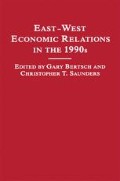Abstract
The world economy is going through a transitional period with two major imbalances which demand correction. On the one hand, financial imbalances pose problems which verge on a crisis situation with (1) mounting external debt for many countries (both developed and developing, see Table 1.1), (2) fluctuating exchange and interest rates, exacerbating the possibility of debt-servicing, and (3) the seemingly ever-increasing speed with which growing amounts of speculative money are moving between the financial centres of the world creating the danger that the system will be shocked into collapse. On the other hand, industrial imbalances (less noticeable than financial sector imbalances) are causing wastes of physical resources at the national and global levels, and hence of potential output growth with problems of (1) unemployment at an unacceptable level in many countries (both developed and developing), (2) unutilised production capacities in many industrial sectors, and (3) increasing threats of protectionism in an effort to solve the problem of industrial slack in a nationalistic manner, but with a certainty of a negative-sum result if every country adopts it simultaneously.
UNIDO, Vienna. The author is solely responsible for the views expressed in this paper, and they do not necessarily represent the official views of UNIDO.
Access this chapter
Tax calculation will be finalised at checkout
Purchases are for personal use only
Preview
Unable to display preview. Download preview PDF.
Notes
See for instance, H. Giersch and F. Wolter, “Towards an explanation of the productivity slowdown: an acceleration-deceleration hypothesis”, Economic Journal, Vol. 93, March 1983, pp. 35–55.
For a lucid analysis of this aspect, see Gerard and Victoria Curzon, “Follies in European Trade Relations with Japan”, World Economy, Vol. 10, No. 2, June 1987, pp. 155–176.
See A. Koekkoek, “The competitive position of the EC in high-tech”, Weltwirtschaftliches Archiv, 1987, 123(1), pp. 159–68.
For a classic example, see Terumoto Ozawa, Japan’s Technological Challenge to the West, 1950–1974: Motivation and Accomplishment, Cambridge, Mass.: MIT Press, 1974.
The Act also represents the awareness by policy-makers that macro-policy measures alone cannot be effective in the face of socio-economic rigidities existing in the region. See Niels Thygesen, “Monetary and Fiscal Policies for Economic Recovery in Europe”, European Economic Review, Vol. 31, 1987, pp. 67–75.
See R.D. Norton, “Industrial Policy and American Renewal”, Journal of Economic Literature, Vol. 24, No. 1, March 1986, pp. 1–40
Author information
Authors and Affiliations
Editor information
Editors and Affiliations
Copyright information
© 1989 Wiener Institut für Internationale Wirtschaftsvergleiche (WIIW) (The Vienna Institute for Comparative Economic Studies)
About this chapter
Cite this chapter
Lim, Y. (1989). Global Imbalances in the World Economy: Challenges and Opportunities For Europe. In: Bertsch, G., Saunders, C.T. (eds) East-West Economic Relations in the 1990s. Vienna Institute for Comparative Economic Studies. Palgrave Macmillan, London. https://doi.org/10.1007/978-1-349-11465-8_2
Download citation
DOI: https://doi.org/10.1007/978-1-349-11465-8_2
Publisher Name: Palgrave Macmillan, London
Print ISBN: 978-1-349-11467-2
Online ISBN: 978-1-349-11465-8
eBook Packages: Palgrave Political & Intern. Studies CollectionPolitical Science and International Studies (R0)

